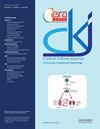Apolipoprotein B-48 and late graft failure in kidney transplant recipients
IF 3.9
2区 医学
Q1 UROLOGY & NEPHROLOGY
引用次数: 0
Abstract
Introduction Transplant vasculopathy resembles atherosclerotic plaque formation and is a major contributor to late graft failure in kidney transplant recipients (KTR). Remnant lipoproteins and associated triglycerides are causal risk factors for atherosclerotic plaques and have been implicated in late kidney graft failure. However, whether remnants derived from liver (containing apolipoprotein [apo] B100) or intestine (containing apoB48) are clinically more important is unclear. The current study investigated the association between baseline fasting apoB48 levels and late kidney graft failure. Methods 481 KTR with a functioning graft for at least one year were included in this retrospective, observational longitudinal single center cohort study. The primary endpoint was death-censored late graft failure, defined as need for initiation of dialysis or re-transplantation. ApoB48 was measured by enzyme-linked immunosorbent assay. Results During a median follow-up of 9.5 years, 61 KTR developed graft failure (12.7%). At baseline, KTR with higher apoB48 levels had lower eGFR (p<0.001), lower HDL cholesterol (p<0.001), increased triglycerides (p<0.001) and used cyclosporine more frequently (p=0.003). Cox regression showed that higher baseline apoB48 was associated with higher risk of late graft failure (hazard ratio [95% confidence interval], 1.59 [1.22, 2.07], p<0.001), independent of stepwise adjustment for potential confounders, including age and sex , immunosuppression type and proteinuria , triglycerides , and waist circumference (fully adjusted HR, 1.78 [1.29, 2.47], p<0.001). Conclusion ApoB48 is strongly associated with late graft failure, independent of potential confounders. Since apoB48-containing lipoproteins originate from the intestine, this study provides a rationale for considering pharmacological interventions targeting lipid absorption to improve graft outcome.载脂蛋白 B-48 与肾移植受者的后期移植失败
导言:移植血管病变类似于动脉粥样硬化斑块的形成,是导致肾移植受者(KTR)晚期移植失败的主要原因。残余脂蛋白和相关甘油三酯是动脉粥样硬化斑块的致病危险因素,并与肾移植晚期失败有关。然而,来自肝脏(含载脂蛋白 [apo] B100)或肠道(含载脂蛋白 B48)的残余脂蛋白在临床上是否更重要尚不清楚。本研究调查了基线空腹载脂蛋白 B48 水平与晚期肾移植失败之间的关系。方法 在这项回顾性、观察性纵向单中心队列研究中,纳入了 481 例移植肾功能正常至少一年的 KTR。研究的主要终点是死亡删减后的晚期移植物衰竭,即需要开始透析或再次移植。载脂蛋白B48通过酶联免疫吸附试验进行测定。结果 在中位随访 9.5 年期间,61 例 KTR 出现移植失败(12.7%)。基线时,apoB48水平较高的KTR具有较低的eGFR(p<0.001)、较低的高密度脂蛋白胆固醇(p<0.001)、较高的甘油三酯(p<0.001),并且更频繁地使用环孢素(p=0.003)。Cox回归显示,基线载脂蛋白B48越高,晚期移植物失败的风险越高(危险比[95%置信区间],1.59 [1.22, 2.07],p<0.001),与潜在混杂因素(包括年龄和性别、免疫抑制类型和蛋白尿、甘油三酯和腰围)的逐步调整无关(完全调整HR,1.78 [1.29, 2.47],p<0.001)。结论 载脂蛋白 B48 与晚期移植失败密切相关,不受潜在混杂因素的影响。由于含载脂蛋白 B48 的脂蛋白来源于肠道,本研究为考虑针对脂质吸收的药物干预以改善移植物预后提供了理论依据。
本文章由计算机程序翻译,如有差异,请以英文原文为准。
求助全文
约1分钟内获得全文
求助全文
来源期刊

Clinical Kidney Journal
Medicine-Transplantation
CiteScore
6.70
自引率
10.90%
发文量
242
审稿时长
8 weeks
期刊介绍:
About the Journal
Clinical Kidney Journal: Clinical and Translational Nephrology (ckj), an official journal of the ERA-EDTA (European Renal Association-European Dialysis and Transplant Association), is a fully open access, online only journal publishing bimonthly. The journal is an essential educational and training resource integrating clinical, translational and educational research into clinical practice. ckj aims to contribute to a translational research culture among nephrologists and kidney pathologists that helps close the gap between basic researchers and practicing clinicians and promote sorely needed innovation in the Nephrology field. All research articles in this journal have undergone peer review.
 求助内容:
求助内容: 应助结果提醒方式:
应助结果提醒方式:


